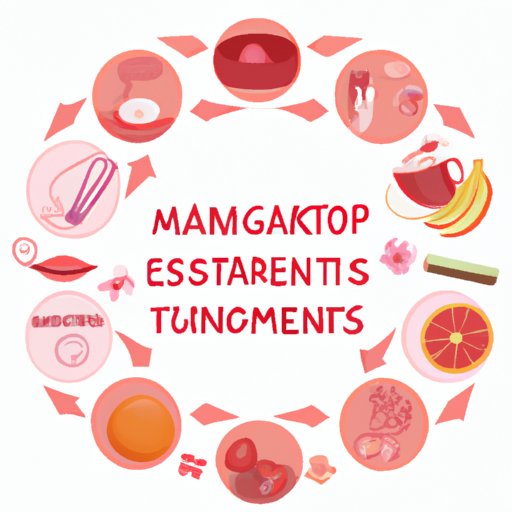
Introduction
Menstrual fatigue is a common complaint among women during their period. It refers to the feeling of exhaustion or tiredness that can occur during menstrual cycles. According to studies, up to 90% of women experience menstrual fatigue. If you’re someone who struggles with this issue, you’re not alone. In this article, we will explore the issue of menstrual fatigue, understand its causes, and offer tips and tricks to combat it.
Statistics on Menstrual Fatigue
Menstrual fatigue is a common phenomenon experienced by most women at one time or another. According to the American College of Obstetricians and Gynecologists, fatigue is a prevalent symptom for women experiencing heavy or prolonged menstrual periods. In addition, the Centers for Disease Control and Prevention (CDC) reports that as many as 1 in every 5 women experience menstrual-related fatigue.
Tips and Tricks
In this article, we will cover various tips and tricks to combat menstrual fatigue, including lifestyle changes, natural remedies, and adapting to hormonal changes during different phases of the menstrual cycle.
Understanding Menstrual Fatigue
What is Menstrual Fatigue?
Menstrual fatigue is a type of fatigue that is experienced by women during their menstrual cycles. Fatigue is defined as a feeling of exhaustion or tiredness. Research has shown that menstrual fatigue can range from mild to severe and can impact daily activities.
Causes of Menstrual Fatigue
Several factors contribute to menstrual fatigue. One of the main causes is hormonal changes that occur during the menstrual cycle. Hormones such as estrogen and progesterone fluctuate significantly during the menstrual cycle, which can contribute to feelings of fatigue.
Another cause of menstrual fatigue is iron deficiency. Iron plays a vital role in the body’s production of red blood cells, which carry oxygen to the body’s tissues. Without enough iron, the body may not produce enough red blood cells to adequately carry oxygen throughout the body, leading to feelings of fatigue.
Tips for Boosting Energy During Your Period
Stay Hydrated
Drinking plenty of water is essential for overall health, but it can also help to combat menstrual fatigue. Dehydration can lead to feelings of fatigue, so it’s important to drink plenty of water throughout the day.
Eat a Balanced Diet
Eating a healthy, balanced diet can also help to combat menstrual fatigue. Incorporating foods that are rich in iron, such as spinach, beans, and red meat, can help to prevent iron deficiency and the resulting fatigue.
Regular Exercise and Yoga
Getting regular exercise can help to boost your overall energy levels. Yoga, in particular, can be an excellent form of exercise during menstruation, as it is low-impact and can help to alleviate cramps.
Quality Sleep
Getting quality sleep is essential for maintaining good health and preventing feelings of fatigue. To improve the quality of your sleep, it is essential to maintain a consistent sleep schedule and to use relaxation techniques such as meditation, deep breathing, or gentle yoga poses before bedtime.
Hormones and Energy Levels
Impact of Estrogen and Progesterone on Energy Levels
The levels of estrogen and progesterone in a woman’s body can significantly impact her energy levels during the menstrual cycle. Estrogen is responsible for stimulating the body’s production of serotonin, a mood-boosting hormone that can also impact energy levels.
Progesterone, on the other hand, can have the opposite effect, leading to feelings of fatigue and low energy. During the luteal phase of the menstrual cycle, progesterone levels tend to rise significantly, leading to feelings of fatigue and low energy.
Adapting to Hormonal Changes During the Menstrual Cycle
It’s important to recognize the hormonal changes that occur during the menstrual cycle and to adapt your lifestyle accordingly. Initiating self-care practices such as taking short naps during the day, taking frequent breaks, and setting boundaries can help to alleviate feelings of fatigue.
Lifestyle Changes to Alleviate Tiredness During Menstruation
Reducing Stress
Stress can take a significant toll on the body, leading to feelings of fatigue and low energy. It’s essential to incorporate stress-reducing activities such as mindfulness, journaling, or therapy to alleviate stress and promote overall well-being.
Short Naps and Frequent Breaks
Taking short naps during the day and taking frequent breaks can help to refresh the body and mind, promoting feelings of rejuvenation and overall well-being.
Setting Boundaries
It’s important to set boundaries and not push yourself too hard. This can mean delegating tasks, saying no to events or activities, and focusing on your physical and emotional needs.
Natural Remedies for Menstrual Fatigue
Supplements
Supplements such as Iron or Vitamin B can help to alleviate menstrual fatigue by providing the body with essential nutrients.
Herbal Remedies
Herbal remedies such as ginger tea or chamomile can help to promote relaxation and reduce feelings of fatigue and stress.
Caffeine Alternatives
To combat feelings of fatigue, many women turn to caffeine and energy drinks. However, these can lead to crashes and further exhaustion. Instead, try alternatives such as herbal tea, lemon water, or green juice.
Menstruation and Sleep Quality
Impact of Menstrual Fatigue on Sleep Quality
Menstrual fatigue can significantly impact sleep quality. Feeling exhausted can make it difficult to fall asleep, and cramps and discomfort can wake you up during the night.
Improving Sleep Hygiene
To improve sleep hygiene during menstruation, try turning off electronic devices before bedtime and using essential oils such as lavender to promote relaxation. Create a comfortable sleep environment that you look forward to each night.
Conclusion
In conclusion, menstrual fatigue is a common issue experienced by many women during their menstrual cycles. It’s essential to recognize the causes, including hormonal changes and iron deficiency, and to adapt to your changing hormonal needs. Incorporate lifestyle changes such as staying hydrated, eating a balanced diet, getting regular exercise, and setting boundaries to reduce stress and promote overall well-being. With the tips and tricks outlined in this article, you can combat menstrual fatigue and feel energized and rejuvenated during your period.





